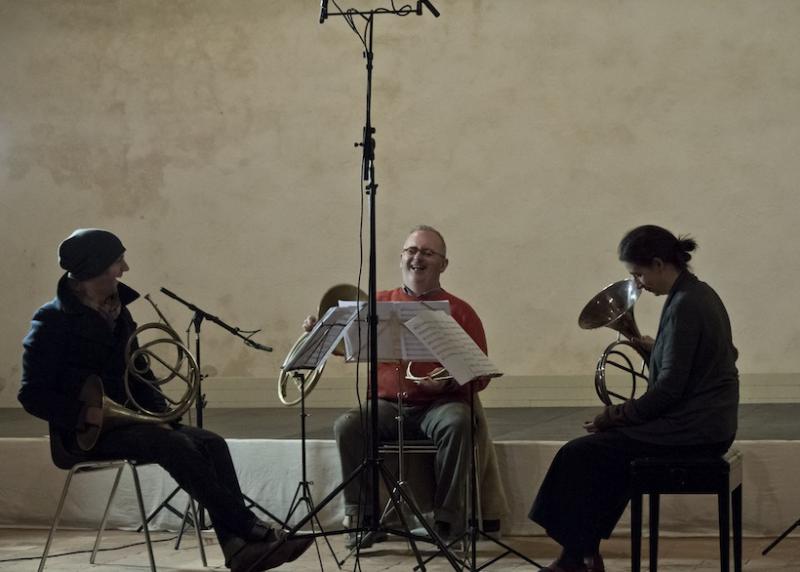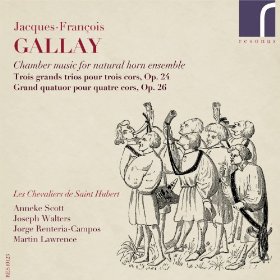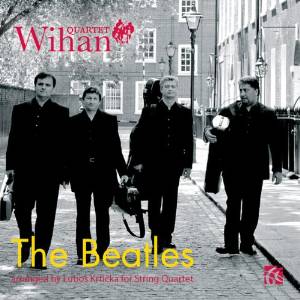Classical CDs Weekly: Gallay, Emma Johnson, Wihan Quartet | reviews, news & interviews
Classical CDs Weekly: Gallay, Emma Johnson, Wihan Quartet
Classical CDs Weekly: Gallay, Emma Johnson, Wihan Quartet
Rousing music for natural horns, clarinet sonatas and the Beatles as you've never heard them


Shove a funnel in one end of a length of hose pipe, and explore the quirks and thrills of the natural horn. Namely that most of the low notes are missing or out of tune. The higher harmonics are closer together, making accurate pitching a bit like throwing a dart whilst wearing a blindfold. Getting round the instrument's limitations requires much jiggery-pokery of right hand and lip. A side-effect of the period performance boom is that modern brass and winds can end up seeming just a little dull, a little safe. This unassuming little disc of trios and quartets by Jacques-François Gallay is a triumph – largely because Anneke Scott's Chevaliers de Saint Hubert revel in the eccentricities of their instruments. Stopped notes sizzle and rasp; pedal notes blast out. Faster, chromatic stretches are tossed off with indecent ease. Gallay was a famous cor solo in Paris in the early 19th century, one of the handful of players who pushed hand-horn technique to its limits – before valves came along and things got a bit easier. None of the trios and quartets here are profound music, but each is brilliantly crafted, suggesting that their composer was a grounded, rounded individual with a healthy sense of humour.
The second Trio is the best of the three assembled here; fiery, minor-key music. The other two are sparkling amuse-bouches: sample the first Trio's finale if you're unsure. Having three instruments of the same length doesn't allow for much harmonic adventure, and Gallay solved the problem by composing in 1832 his Grand Quartet for four horns in different crooks. The technical complexities don't bear thinking about. At times it's like listening to an operatic ensemble. There's drama, beauty and bite, all delivered with smiling panache. Nicely recorded, and Scott's erudite notes make interesting reading.
 Brave New World – Music for Clarinet and Piano Emma Johnson (clarinet), John Lenehan (piano) (Champs Hill)
Brave New World – Music for Clarinet and Piano Emma Johnson (clarinet), John Lenehan (piano) (Champs Hill)
Prokofiev's Flute Sonata has been transcribed before – David Oistrakh helped transform it into a violin sonata. Hearing it played on clarinet almost works – the extravagant slurs across the instrument's range sound terrific, and Emma Johnson's high register is sensational. She understands this composer's style too, the mood alternately lyrical and flippant. But the original version is so well-written for the flute, and even a virtuoso clarinettist can't articulate with the same agility – the rapid staccato passages in the first movement can't help sounding cumbersome. The middle movements sound more idiomatic, and Prokofiev's closing Allegro con brio is genuinely effective in Johnson's transposition. The industrious Hindemith churned out 26 instrumental sonatas, 25 of them composed for instruments he could actually play (the harp being the one exception). This explains why they're so well-written – if you're learning the Eb alto horn or or tuba, Hindemith's your man. His 1939 Clarinet Sonata is one of the best, the slow movement's weight overshadowing a throwaway finale which sounds like a vain attempt at musical distraction – the sonata was written shortly before the composer left Europe for the United States. Johnson gets the music's seriousness, without ever sounding dour.
Nino Rota, best-known for scoring several Fellini films, is represented by a 1945 Sonata. Malcolm MacDonald's sleeve notes describe Rota as “an Italian Poulenc”. It's pleasant, slightly anonymous stuff, lacking the sharpness and vivacity of Poulenc's wind music. We're on more familiar ground with Lutosławski's Dance Preludes, five miniatures completed in 1955 as a “farewell to folklore”, an epilogue to his Concerto for Orchestra. I've grown to love them in their orchestrated form, but the lean piano accompaniments are neatly played here by John Lenehan. Two short pieces by Messiaen complete the disc – an intense account of the Abîme des oiseaux from the Quartet for the End of Time, and an idiomatic transcription of a smoochy 1935 vocalise. All expertly performed and well-recorded. The catalogue isn't bulging with recitals of 20th-century clarinet music, making this a welcome release.
 Quartet Wihan: The Beatles (arranged by Luboš Krtička) (Nimbus Alliance)
Quartet Wihan: The Beatles (arranged by Luboš Krtička) (Nimbus Alliance)
No band's back catalogue has been massacred like that of the Beatles, and a quick Google search mentions arrangements for pan pipes, ocarinas, accordions and full orchestra. One suspects that most of them are dire. This unassuming anthology is revelatory, though – a thoroughbred Prague-based string quartet playing 13 Beatles songs, in superb, sophisticated arrangements by the eclectic Czech composer Luboš Krtička. In the unlikely event of anyone not knowing the originals, they'd probably identify each track as a wonderfully crafted quartet miniature. Krtička's scoring is invariably so right, and every liberty taken should have open-minded listeners cheering. I'm thinking of the Ponticelli scrapings at the start of "Lucy in the Sky with Diamonds", and the Respighi-like birdsong which pops up near the close of "Blackbird". Or the antiphonal taps which give colour to the opening of "Come Together". This track needs to be listened to through headphones.
That these players approach Krtička's recastings with utter sincerity and conviction is a given; there's never any sense that they're slumming it. The choice moments are too many to mention – the soft introduction to "Here Comes the Sun", and the delectable, hushed coda in the opening of "Julia" are sublime. A lovely disc.
Explore topics
Share this article
The future of Arts Journalism
You can stop theartsdesk.com closing!
We urgently need financing to survive. Our fundraising drive has thus far raised £49,000 but we need to reach £100,000 or we will be forced to close. Please contribute here: https://gofund.me/c3f6033d
And if you can forward this information to anyone who might assist, we’d be grateful.

Subscribe to theartsdesk.com
Thank you for continuing to read our work on theartsdesk.com. For unlimited access to every article in its entirety, including our archive of more than 15,000 pieces, we're asking for £5 per month or £40 per year. We feel it's a very good deal, and hope you do too.
To take a subscription now simply click here.
And if you're looking for that extra gift for a friend or family member, why not treat them to a theartsdesk.com gift subscription?
more Classical music
 RNCM International Diploma Artists, BBC Philharmonic, MediaCity, Salford review - spotting stars of tomorrow
Cream of the graduate crop from Manchester's Music College show what they can do
RNCM International Diploma Artists, BBC Philharmonic, MediaCity, Salford review - spotting stars of tomorrow
Cream of the graduate crop from Manchester's Music College show what they can do
 Classical CDs: Bells, whistles and bowing techniques
A great pianist's early recordings boxed up, plus classical string quartets, French piano trios and a big American symphony
Classical CDs: Bells, whistles and bowing techniques
A great pianist's early recordings boxed up, plus classical string quartets, French piano trios and a big American symphony
 Monteverdi Choir, English Baroque Soloists, Suzuki, St Martin-in-the-Fields review - the perfect temperature for Bach
A dream cantata date for Japanese maestro and local supergroup
Monteverdi Choir, English Baroque Soloists, Suzuki, St Martin-in-the-Fields review - the perfect temperature for Bach
A dream cantata date for Japanese maestro and local supergroup
 Aldeburgh Festival, Weekend 1 review - dance to the music of time
From Chekhovian opera to supernatural ballads, past passions return to life by the sea
Aldeburgh Festival, Weekend 1 review - dance to the music of time
From Chekhovian opera to supernatural ballads, past passions return to life by the sea
 Dandy, BBC Philharmonic, Storgårds, Bridgewater Hall, Manchester review - a destination attained
A powerful experience endorses Storgårds’ continued relationship with the orchestra
Dandy, BBC Philharmonic, Storgårds, Bridgewater Hall, Manchester review - a destination attained
A powerful experience endorses Storgårds’ continued relationship with the orchestra
 Hespèrion XXI, Savall, QEH review - an evening filled with laughter and light
An exhilarating exploration of innovation in 16th and 17th century repertoire
Hespèrion XXI, Savall, QEH review - an evening filled with laughter and light
An exhilarating exploration of innovation in 16th and 17th century repertoire
 theartsdesk at the Dublin International Chamber Music Festival - musical revelations, nature beyond
Artistic director Ciara Higgins’ programming ensures plenty of surprises
theartsdesk at the Dublin International Chamber Music Festival - musical revelations, nature beyond
Artistic director Ciara Higgins’ programming ensures plenty of surprises
 Müller-Schott, RSNO, Søndergård, Usher Hall, Edinburgh - spectacular Shostakovich to end the season
Brilliant orchestral results, while the cellist walks a tightrope in the Second Cello Concerto
Müller-Schott, RSNO, Søndergård, Usher Hall, Edinburgh - spectacular Shostakovich to end the season
Brilliant orchestral results, while the cellist walks a tightrope in the Second Cello Concerto
 Classical CDs: Cannons, culverts and mooching cattle
Box sets celebrating a pair of conductors, plus baroque vocal music and a beguiling bassoon anthology
Classical CDs: Cannons, culverts and mooching cattle
Box sets celebrating a pair of conductors, plus baroque vocal music and a beguiling bassoon anthology
 Marwood, Crabb, Wigmore Hall review - tangos, laments and an ascending lark
Accordion virtuoso’s brilliant arrangements showcase the possibilities of the instrument
Marwood, Crabb, Wigmore Hall review - tangos, laments and an ascending lark
Accordion virtuoso’s brilliant arrangements showcase the possibilities of the instrument

Add comment